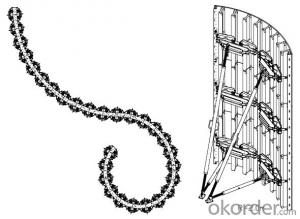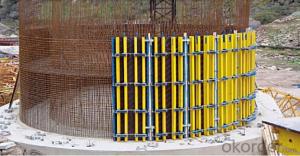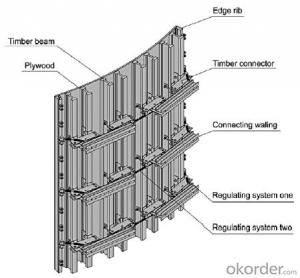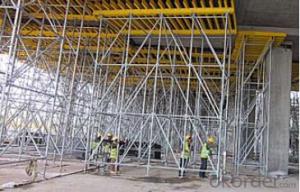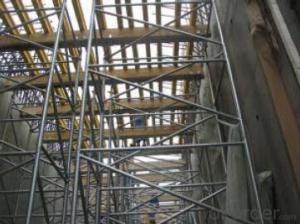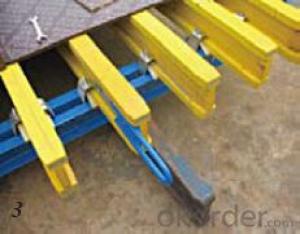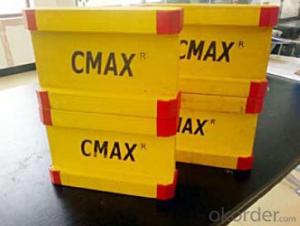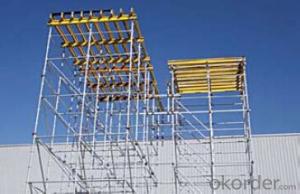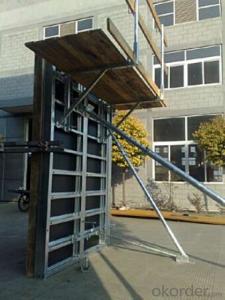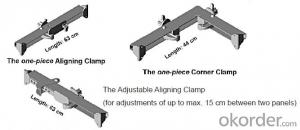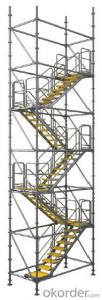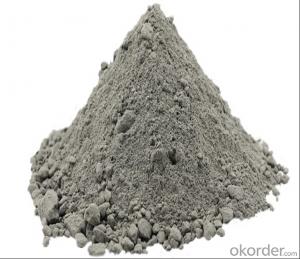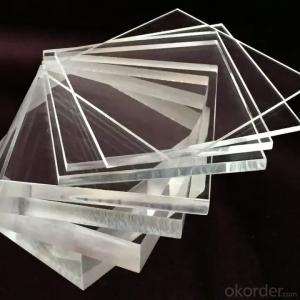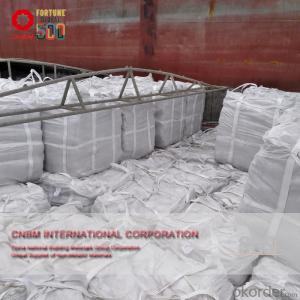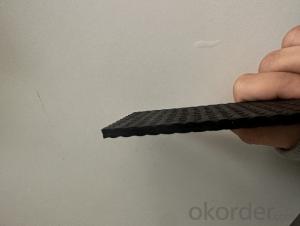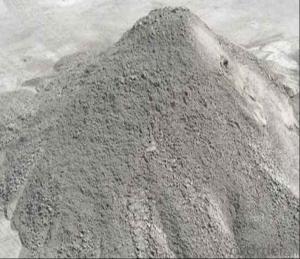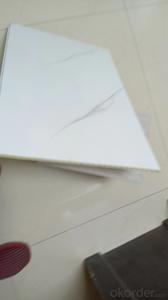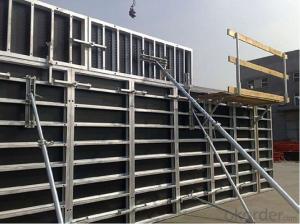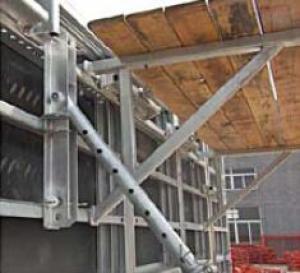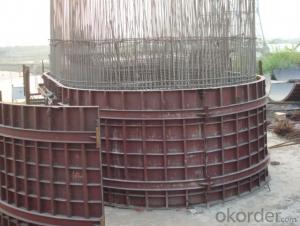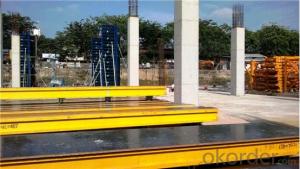Adjustable arced steel formwork
- Loading Port:
- China Main Port
- Payment Terms:
- TT OR LC
- Min Order Qty:
- -
- Supply Capability:
- -
OKorder Service Pledge
Quality Product, Order Online Tracking, Timely Delivery
OKorder Financial Service
Credit Rating, Credit Services, Credit Purchasing
You Might Also Like
Adjustable Arced Formwork
For pouring arced wall or column with radius more than 1m.
Characteristics:
◆ Adjustable radius, flexible application.
◆ Easy operating, economical efficiency.
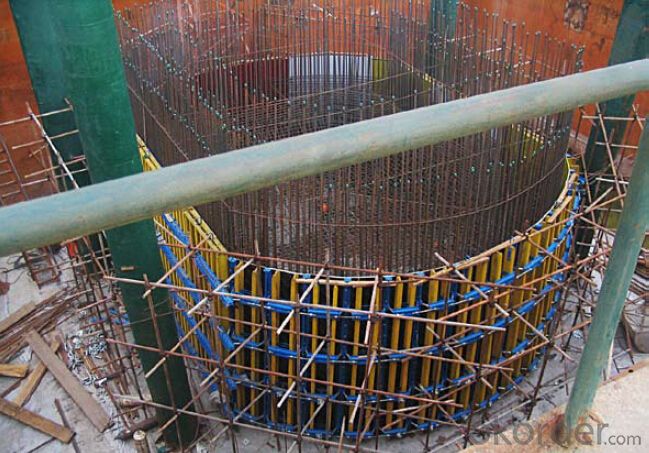
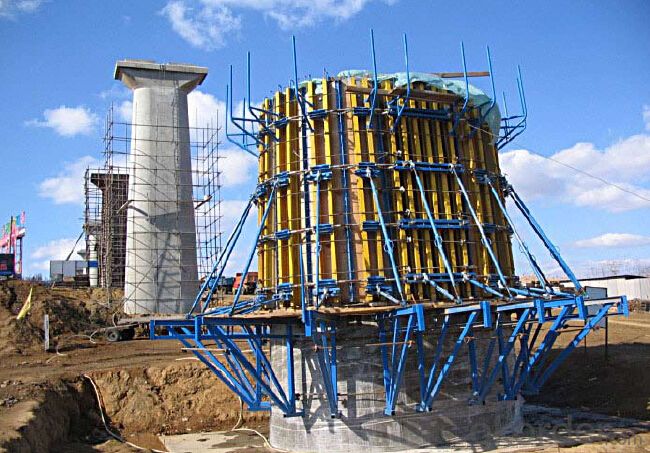
- Q:What are the different types of steel used for formwork construction?
- There are several different types of steel that are commonly used for formwork construction. These include: 1. Mild Steel: This is the most commonly used type of steel for formwork construction. It is relatively inexpensive and has good strength and durability. Mild steel is suitable for most formwork applications and can withstand the pressure exerted by concrete during pouring. 2. High-strength Steel: As the name suggests, high-strength steel has greater strength and toughness than mild steel. It is often used in formwork construction where there is a need for higher load-bearing capacity or where the structure requires additional reinforcement. High-strength steel is more expensive than mild steel but provides greater structural integrity. 3. Structural Steel: This type of steel is commonly used in formwork construction for larger and more complex structures. It has high tensile strength and is capable of withstanding heavy loads. Structural steel is often used for formwork systems that require long spans, such as bridge construction or high-rise buildings. 4. Reinforcing Steel: Reinforcing steel, also known as rebar, is used in formwork construction to provide additional strength and reinforcement to the concrete structure. It is typically made of mild steel or high-strength steel and is placed within the formwork before pouring the concrete. Reinforcing steel helps to prevent cracking and improves the overall structural integrity of the formwork. 5. Stainless Steel: In certain cases, stainless steel may be used for formwork construction, especially in environments where corrosion resistance is required. Stainless steel has excellent resistance to rust and corrosion, making it suitable for use in marine or coastal construction projects. However, stainless steel is more expensive than other types of steel and may not be necessary for all formwork applications. In conclusion, the different types of steel used for formwork construction include mild steel, high-strength steel, structural steel, reinforcing steel, and stainless steel. The choice of steel will depend on factors such as load-bearing capacity, structural requirements, and environmental conditions.
- Q:Can steel formwork be used for industrial flooring?
- Yes, steel formwork can be used for industrial flooring. Steel formwork is known for its durability and strength, making it suitable for heavy-duty applications such as industrial flooring. It can withstand the weight and pressure exerted by heavy machinery and equipment, providing a stable and sturdy base for industrial operations. Additionally, steel formwork offers the advantage of being reusable, which makes it a cost-effective choice for flooring in industrial settings.
- Q:Can steel formwork be used for road construction?
- Indeed, road construction can involve the utilization of steel formwork. This particular method is widely favored in road construction endeavors owing to its exceptional resilience, robustness, and adaptability. Given its ability to endure substantial loads and pressure, it is highly suitable for the creation of durable and enduring road surfaces. The assembly and disassembly of steel formwork is a straightforward process, thereby facilitating efficient construction procedures and expediting project completion. Moreover, this formwork can be reused on numerous occasions, rendering it an economically sensible choice for road construction projects.
- Q:How does steel formwork affect the overall aesthetics of a structure?
- The overall aesthetics of a structure can be significantly influenced by steel formwork. Unlike traditional wooden formwork, steel formwork gives concrete a smooth and sleek finish, resulting in a more visually pleasing appearance. The use of steel formwork enables precise shaping of the concrete, ensuring clean lines and smooth surfaces. Additionally, architects and designers can use steel formwork to create intricate and complex designs that would be difficult to achieve with other types of formwork. The strength and durability of steel formwork allow for the creation of unique shapes and patterns, enhancing the artistic value of the structure. Apart from its aesthetic advantages, steel formwork also offers practical benefits. It is reusable, making it a cost-effective option in the long term. Reusing steel formwork reduces waste and promotes sustainable construction practices. Furthermore, the durability of steel formwork means that the structure maintains its aesthetic appeal for many years, as it is less prone to wear and tear compared to other formwork materials. In conclusion, steel formwork plays a crucial role in enhancing the overall aesthetics of a structure. It provides a smooth and clean finish, allows for intricate designs, and offers long-lasting durability. Architects and designers can rely on steel formwork to achieve their desired visual impact while ensuring the structural integrity of the project.
- Q:What are the typical load capacities of steel formwork systems?
- The typical load capacities of steel formwork systems vary depending on the specific design, size, and thickness of the steel components. However, they generally range from 50 kN/m² to 150 kN/m², allowing them to support heavy concrete loads during construction projects.
- Q:Is steel formwork suitable for projects with limited construction space?
- Indeed, projects with limited construction space can benefit greatly from the utilization of steel formwork. Renowned for its adaptability and capacity to be tailored to different project specifications, especially those constrained by space restrictions, steel formwork stands as a lightweight and resilient alternative. Its inherent feasibility in terms of assembly, disassembly, and mobility further contributes to optimal space utilization. Moreover, steel formwork guarantees a remarkable level of precision and accuracy, facilitating a seamless and efficient construction process within the confines of limited space.
- Q:How does steel formwork affect the structural integrity of a building?
- Steel formwork is a construction technique that uses steel molds to create the desired shape and structure of concrete elements in a building. It plays a crucial role in the construction process and affects the structural integrity of a building in several ways. Firstly, steel formwork provides a strong and rigid support system for the wet concrete during the pouring and setting process. Its robustness ensures that the concrete remains in the desired shape and prevents any deformation or collapse. This is particularly important for structural elements such as beams, columns, and walls, as it ensures their proper alignment and stability. Additionally, steel formwork allows for precise and accurate construction. The molds can be fabricated with great precision, resulting in accurate dimensions and shapes for the concrete elements. This precision is essential for maintaining the structural integrity of the building, as any slight deviation or misalignment can compromise the overall strength and stability of the structure. Moreover, steel formwork provides a smooth surface finish to the concrete. This smoothness is not only aesthetically pleasing but also contributes to the structural integrity of the building. A smooth surface reduces the likelihood of cracks, voids, or air pockets in the concrete, which can weaken its strength and durability. Furthermore, steel formwork offers durability and reusability. Unlike other types of formwork, such as wood or plastic, steel formwork can withstand multiple uses without losing its structural integrity. This reusability not only saves construction costs but also ensures consistency in the quality of the concrete elements throughout the building. Lastly, steel formwork enhances the overall structural stability of the building. The use of steel molds provides a rigid framework that distributes the loads evenly and efficiently. This distribution of loads minimizes the risk of localized stress concentrations, thereby improving the structural integrity of the building and increasing its overall resistance to external forces such as wind, earthquakes, or heavy loads. In conclusion, steel formwork significantly impacts the structural integrity of a building in a positive way. It provides a strong support system, ensures precision and accuracy, offers a smooth surface finish, provides durability and reusability, and enhances overall structural stability. All these factors contribute to the strength, stability, and longevity of the building, making steel formwork an essential component in modern construction practices.
- Q:Can steel formwork be used for projects with limited formwork storage space?
- Projects with limited formwork storage space can utilize steel formwork. This type of formwork is renowned for its durability and reusability, making it a favorable option for such projects. Unlike conventional timber formwork, steel formwork can be dismantled and stored in a condensed manner, maximizing the use of limited storage space. Furthermore, steel formwork can be swiftly assembled and disassembled, minimizing the time and effort involved in formwork installation and removal. In conclusion, steel formwork is an appropriate choice for projects with restricted formwork storage capacity due to its compact storage capabilities and effortless handling.
- Q:Can steel formwork be used for foundation construction?
- Yes, steel formwork can be used for foundation construction. Steel formwork provides strength, durability, and stability, making it suitable for constructing foundations that require support and resistance to external pressures. It allows for accurate and precise shaping of foundations and can be easily assembled, disassembled, and reused, making it a cost-effective choice for foundation construction.
- Q:What are the considerations when selecting the appropriate steel grade for formwork?
- When it comes to selecting the right steel grade for formwork, there are several factors that need to be considered. First and foremost, the load-bearing capacity of the steel grade is of utmost importance. It must be able to withstand the weight and pressure exerted by the concrete and any additional loads during construction, while maintaining its structural integrity without any deformation or failure. Another crucial consideration is the corrosion resistance of the steel grade. Since formwork is often exposed to moisture and chemicals from the concrete, it is vital to choose a steel grade that can resist corrosion. This will ensure the longevity and durability of the formwork, avoiding any safety hazards or costly repairs. Furthermore, the ease of handling and fabrication is an important factor. The selected steel grade should be easy to cut, shape, and weld, allowing for efficient and accurate construction of the formwork. It should also have good dimensional stability, ensuring that the formwork remains in the desired shape and size during use. Cost-effectiveness is also a significant factor to consider. While it may be tempting to choose a higher grade steel with superior properties, it is important to evaluate the project requirements and select a grade that offers the necessary performance at a reasonable cost. This will help optimize the budget without compromising the quality and functionality of the formwork. Lastly, compliance with industry standards and regulations should not be overlooked. The selected steel grade must meet the relevant codes and specifications set by governing bodies to ensure that the formwork meets safety standards and can withstand the intended loads and environmental conditions. By considering these factors, one can choose an appropriate steel grade for formwork that provides structural stability, durability, corrosion resistance, ease of handling, cost-effectiveness, and compliance with industry standards.
1. Manufacturer Overview |
|
|---|---|
| Location | |
| Year Established | |
| Annual Output Value | |
| Main Markets | |
| Company Certifications | |
2. Manufacturer Certificates |
|
|---|---|
| a) Certification Name | |
| Range | |
| Reference | |
| Validity Period | |
3. Manufacturer Capability |
|
|---|---|
| a)Trade Capacity | |
| Nearest Port | |
| Export Percentage | |
| No.of Employees in Trade Department | |
| Language Spoken: | |
| b)Factory Information | |
| Factory Size: | |
| No. of Production Lines | |
| Contract Manufacturing | |
| Product Price Range | |
Send your message to us
Adjustable arced steel formwork
- Loading Port:
- China Main Port
- Payment Terms:
- TT OR LC
- Min Order Qty:
- -
- Supply Capability:
- -
OKorder Service Pledge
Quality Product, Order Online Tracking, Timely Delivery
OKorder Financial Service
Credit Rating, Credit Services, Credit Purchasing
Similar products
New products
Hot products
Related keywords
